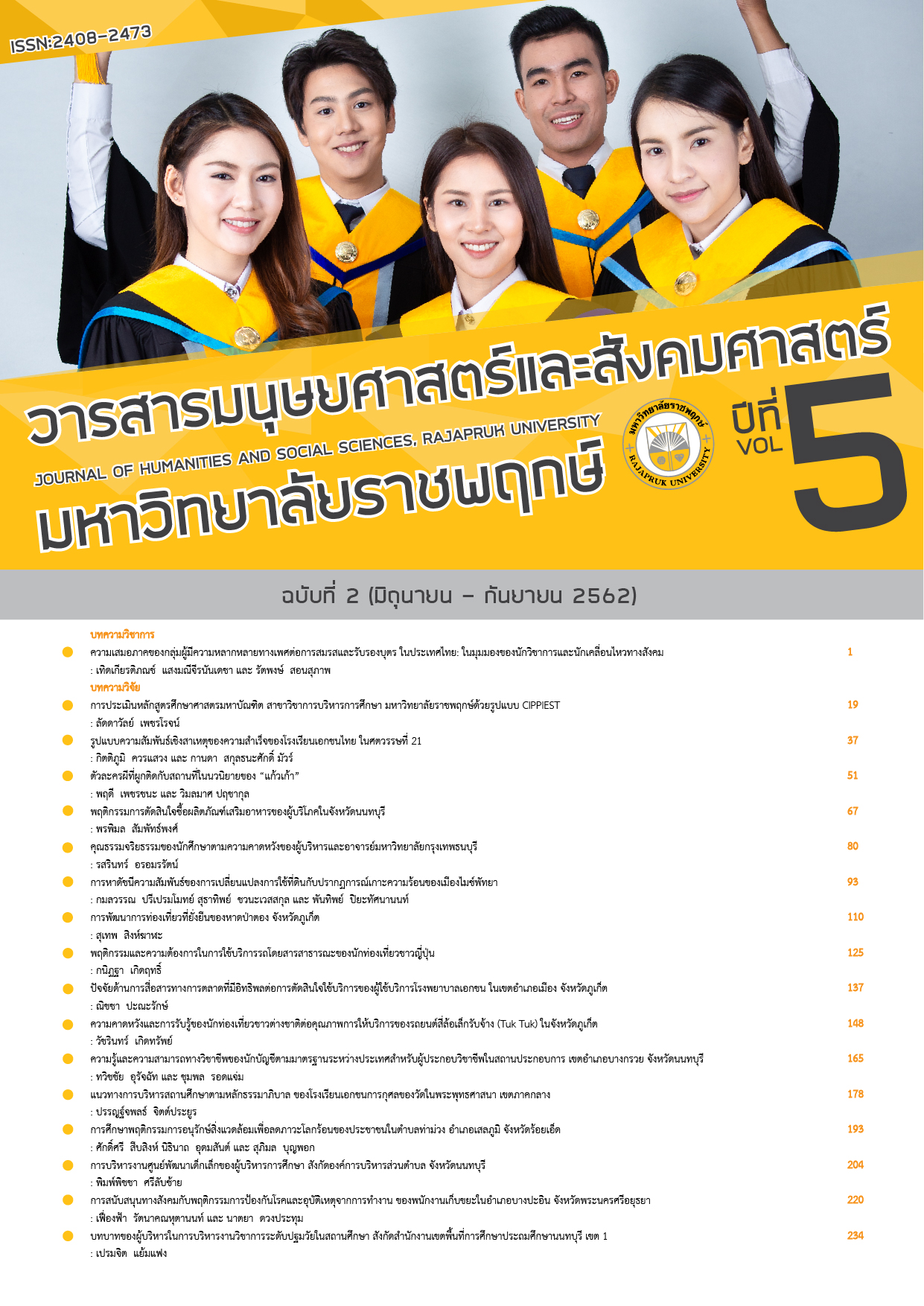Sustainable Tourism Development of Patong Beach Phuket Province
Main Article Content
Abstract
This research aims to study and compare the level of reviews of tour operators continue to sustainable tourism development in the overview based on the marital status of personnel and to set guidelines for sustainable tourism development of Patong Beach Phuket Province. By having a sample of 2 groups as follows: 1) tour operators, accommodation business and recreation business by questionnaire of 315 and 2) sample that is used in the interview 5 people including the local administration Patong municipality, Phuket Province 2 people and stakeholders 3 people. The data were analyzed using statistical frequency distribution, percentage, mean, standard deviation, t-test, One-way ANOVA and qualitative data using content analysis. The results showed that; The sustainable tourism development of Patong beach Phuket Province the overall rating is based on a massive scale and when considering a list of aspects found to below average the satisfaction of tourists, the benefits of tourism, natural resource, planning and management and the quality of the environment is moderate. The tour operators’ opinion comparison found that male opinions on sustainable tourism development than female in the management plan the quality of the environment and the satisfaction of tourists statistically significant at the .05 level. The age found to have comments on the sustainable development of tourism does not different. The study found that tour operators with different education background had opinions on sustainable tourism development in natural resources, planning and management, and the quality of the environment the statistical significance .05 level. And found that the overall of tour business with less than business accommodation and less than business recreation had different at .05 significant. The tourism development of Patong beach Phuket Province to include sustainability create a new tourist attraction in the municipality of Patong such as the Ban Mon community, Wang Kee on Waterfall, Nanai community, Chaiwat community, Parkbang community. Provide Halal village project (Halal Village) at Ban Kalim Patong, low carbon city (Low Carbon), such as the campaign for the bicycle, establishment of conservation Club of Patong beach and editor urban planning law, appropriate, consistent with the growth of the town in the future.
Article Details
References
ชัชพล ทรงสุนทรวงศ์. (2545). การจัดการนันทนาการและการท่องเที่ยวธรรมชาติ. นนทบุรี: มหาวิทยาลัยสุโขทัยธรรมาธิราช.
ณัฐวรรธน์ สุนทรวริทธิโชติ. (2556). การศึกษาสภาพปัญหาสิ่งแวดล้อมในเขตตำบลสามบัณฑิต: กรณีศึกษาปัจจัยที่มีผลต่อการพัฒนาทรัพยากรธรรมชาติและสิ่งแวดล้อมของประชาชน. รายงานการวิจัย คณะมนุษยศาสตร์และสังคมศาสตร์ มหาวิทยาลัยราชภัฏพระนครศรีอยุธยา.
เทศบาลเมืองป่าตอง. (2558). แผนยุทธศาสตร์การพัฒนา พ.ศ. 2557 – 2561. งานวิเคราะห์นโยบายและแผน กองวิชาการและแผนงาน เทศบาลเมืองป่าตอง.
ภัสสรกรณ์ ลังกาฟ้า. (2553). ผลกระทบทางด้านเศรษฐกิจและสังคมของการท่องเที่ยวในชุมชนหมู่บ้านดอยปุย จังหวัดเชียงใหม่. รายงานการวิจัย คณะเศรษฐศาสตร์ มหาวิทยาลัยเชียงใหม่.
สำนักงานทะเบียนธุรกิจนำเที่ยวและมัคคุเทศก์. (2558). รายชื่อธุรกิจนำเที่ยว. สาขาภาคใต้เขต 2 ภูเก็ต.
สุเทพ สิงห์ฆาฬะ. (2560). แนวทางการพัฒนาการท่องเที่ยวที่ยั่งยืนในมุมมองของผู้ประกอบการท่องเที่ยวและองค์กรปกครองส่วนท้องถิ่น ตำบลกมลา อำเภอกะทู้ จังหวัดภูเก็ต. วารสารมนุษย์ศาสตร์และสังคมศาสตร์ มหาวิทยาลัยราชพฤกษ์, 3(2) มิถุนายน-กันยายน 2560.
อนุรักษ์ ปัญญานุวัฒน์. (2542). ชุมชน ทรัพยากรและการพัฒนาสิ่งแวดล้อม. เอกสารประกอบคำสอน สาขาวิชาการจัดการมนุษย์กับสิ่งแวดล้อม มหาวิทยาลัยเชียงใหม่.
อุษาวดี พูลพิพัฒน์. (2545). การท่องเที่ยวแบบยั่งยืน: กรณีศึกษาการท่องเที่ยวเชิงนิเวศโดยชุมชนในประเทศไทย. จุลสารการท่องเที่ยว. 21 (ตุลาคม-ธันวาคม).
Krjcie, R.V. and Morgan, D.W. (1970). Determining Sample Size for Research Activities. Educational and Psychological Measurement, 30(3): 607 - 610.
Langkafa, P. (2010). Socio-economic Impact of Tourism in Doi Pui Village Community. Chiangmai Province. Research Report The Faculty of Economics Chiang Mai University. (in Thai)
Municipality of Patong. (2015). Strategic Development Plan 2014 – 2016. Policy Analysis and Planning Technical and Planning Division Municipality of Patong.
Panyanuwat, A. (1999). Community Resources and Environmental Development. Doctrine Human Resource Management Chiang Mai University. (in Thai)
Pulpipat, U. (2002). Sustainable Tourism: A Case Study of Ecotourism by Community in Thailand. TAT review magazine. 21 (October – December 2002). (in Thai)
Songsunthornwong, C. (2002). Recreation Management and Natural Tourism. Nonthaburi: Sukhothai Thammathirat Open University. (in Thai)
Soonthornvirittichoti, N. (2013). Study of environmental problems in Sam Bandit district: a case study of factors affecting the development of natural resources and the environment of people. Research report Faculty of Humanities and Social Sciences, Phranakhon Sri Ayutthaya Rajabhat University.
Singkhalah, S. (2017). Guidelines for sustainable tourism development in the perspective of tourism operators and local administrative organizations in Kamala Subdistrict, Kathu District, Phuket Province. Journal of Human Sciences and Social Sciences Rajapruk University, 3(2) June – September 2017.
Travel and Tour Operator Registration Office. (2015). List of Tour Operators. Southern Region Branch 2 Phuket. (in Thai)
Wannatanom, C. (2009). Tourism Industry. Bangkok: Samlada Partnership Limited.
World Tourism Organization. (1998). Guide for local authorities on developing sustainable tourism. Madrid, Spain.
World Tourism Organization. (2004). Indicators of Sustainable development for tourism destinations: A Guidebook. World Tourism Organization.

